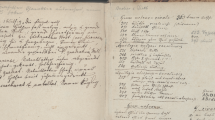Abstract
I SEE from the published account of a recent discussion at the Cambridge meeting of the British Association that the facts of Mendelian segregation are still disputed by the biometric school of evolutionists. I venture, therefore, to submit to your readers the result of an experiment carried out at the Royal Botanic Gardens, Peradeniya, which, in my opinion, proves conclusively that in a particular crossbred form a particular pair of characters did become segregated in equal numbers of germ cells, both male and female. The characters in question were:—the appearance and absence respectively of a yellow coloration in the endosperm of grains of Indian corn (Zea Mays). These characters are discontinuous in the strain examined. Among about 100,000 grains which passed under my notice, I saw only two which were partly yellow and partly white; these were counted as yellow, being presumably heterozygotes.
This is a preview of subscription content, access via your institution
Access options
Subscribe to this journal
Receive 51 print issues and online access
$199.00 per year
only $3.90 per issue
Buy this article
- Purchase on Springer Link
- Instant access to full article PDF
Prices may be subject to local taxes which are calculated during checkout
Similar content being viewed by others
Author information
Authors and Affiliations
Rights and permissions
About this article
Cite this article
LOCK, R. Mendel's Law: a Crucial Experiment. Nature 70, 601–602 (1904). https://doi.org/10.1038/070601b0
Issue Date:
DOI: https://doi.org/10.1038/070601b0
Comments
By submitting a comment you agree to abide by our Terms and Community Guidelines. If you find something abusive or that does not comply with our terms or guidelines please flag it as inappropriate.


